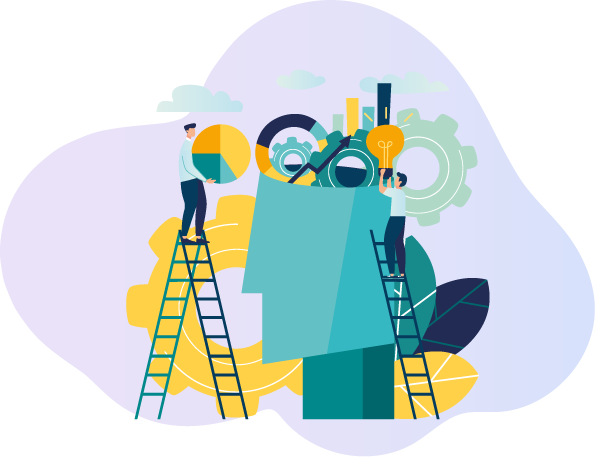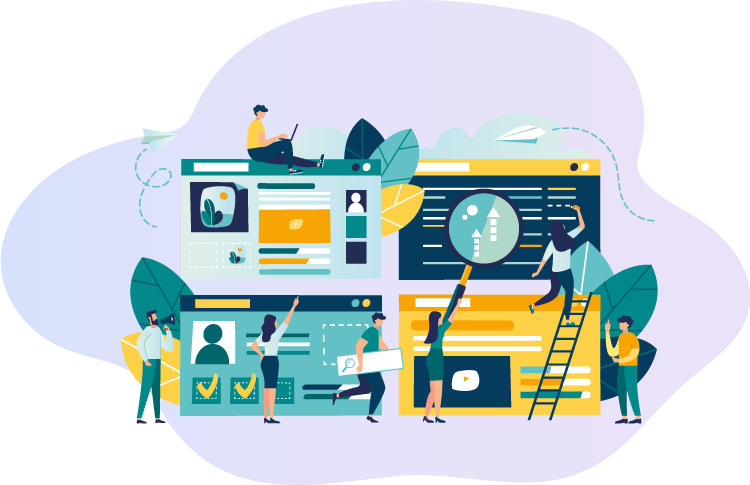Who's a Big Data Developer?
A big data developer is like a mango in a basket of fruits. No matter what the recent trends are or the latest technological development – a big data developer is one of the most popular careers of the decade! As a Big Data Developer, you will read and understand the massive amount of data available out there. You will analyse the data to reveal trends, patterns, and other useful things that can help businesses make plans and products that perform better.
It’s safe to say that the demand for a Big Data Developer is only going to increase at a steady rate as more and more organisations are looking to outsource their work. Sounds interesting? Keep scrolling to know more!
What will you do?
Discover your Ideal future
Get expert guidance and mentorship towards your perfect fit.
Where will you work?
How do you get there?
What skills would you need?
How do you make it to the top ranks?
Data Analyst
As a data analyst, you will collect and store data on sales numbers, market research, logistics, linguistics, and other behaviours. You will bring technical expertise for quality assurance and accuracy of data. You will then process, design, and present this data in to help people, businesses, and organisations make better decisions.
Big Data Developer
As a Big Data Developer, you are responsible for the actual coding or programming of Hadoop applications: quite similar to a Software Developer. They could work on trillions of bytes of data each day with the help of different programming languages like Java, C++, Ruby, etc. along with several databases.
Data Scientist
As a data scientist, you will collect, clean, and validate business data. Your primary role will require persistence and software engineering skills to understand data bias and to debug output from code. In simple terms, you will find patterns in otherwise meaningless data and use this knowledge to improve and enhance it.
Big Data Engineer
As a Big Data Engineer, it will be your responsibility to create and manage data infrastructure and tools, including collecting, storing, processing and analysing a range of data and data systems. If you can work quickly and accurately, using the best solutions to analyse mass data sets, then you know how to get results. As a big data engineer, it will be your task to make data easily accessible and usable in multiple departments across the company.
Vice President of Data Science
As a VP of Data Science, you’ll define, lead and convert ground breaking analytics solutions. You will lead several cross-functional teams to define, implement and promote cutting-edge data engineering solutions with new and existing clients. You will have to provide expertise in fundamental skill areas, such as statistical methods, machine learning, AI, distributed computing, and programming with open-source languages. You will have to deliver thought leadership and innovation in process.
Pursuing your career locally VS abroad
Big Data is everywhere and there is the need to collect and preserve whatever data is being generated, for the fear of missing out on something important. With the huge amount of data available, the demand for big data developers has skyrocketed. It is expected that in the next few years, the size of the analytics market will evolve to at least one-thirds of the global IT market from the current one-tenths.
Though India has a concentration of analytics globally, the data scarcity talent is rather acute and there is a huge demand for this talent. More and more organisations are outsourcing their work to skilled professionals. In India, the salary for big data professionals is one of the highest among software engineers.
As a Big Data Developer, your salary in India can range between ₹ 4.0 Lakhs to ₹ 15.0 Lakhs with an average annual salary of ₹ 7.0 Lakhs. A huge array of organisations like Ayata, IBM, Alteryx, Teradata, TIBCO, Microsoft, Platfora, ITrend, Karmasphere, Oracle, Opera, Datameer, Pentaho, Centrifuge, FICO, Domo, Quid, Saffron, Jaspersoft, GoodData, Bluefin Labs, Tracx, Panorama Software, and countless more are implementing Big Data Analytics in their business models thereby providing a vast number of job opportunities.
If you wish to pursue a Master’s in Data Science or Big Data from abroad then you have to be careful of the university you are applying to. Ideally, it should be from one of the top 10 schools in the world, like CMU, Cornell or Stanford, among others, since anything less than the top 10 could mean that your chances of getting a job are slim.
However, there are many who believe that a Master’s in a specialised field like Data Science or Big Data Analytics may not be as helpful as a MS in Computer Science or Statistics. Since these jobs have become the need of the hour, several international universities have kick-started data science programmes to ride in on the big data wave. The curriculum design is largely representative of what top-notch universities like Berkeley, CMU, Stanford and MIT offer.
However, whichever university you are choosing to do your degree from, a STEM degree can set one back by INR 46,00,000, minimum which coupled with the cost of living and upkeep, would make it even costlier. A postgraduate degree in the US consisting of a combination of theory, applied learning and hands-on projects makes it a better option than traditional postgraduate courses offered in India.
If you believe you can make it well on your own by putting together online certifications, boot camps and work experience, then an MS option is not compulsory for pursuing a career as a big data developer.
How much would you get paid?
Normally, as a Big data Developer, you will get a starting package of INR 3.5 to INR 5 lakhs per annum, which with an experience of around two to three years, it can easily go up to INR 9 to 10 lakhs per annum. However, the big data job market is highly competitive so you need to be properly equipped with adequate certifications and hands-on project experience.
What are your career options?
Discover your Ideal future
Get expert guidance and mentorship towards your perfect fit.








